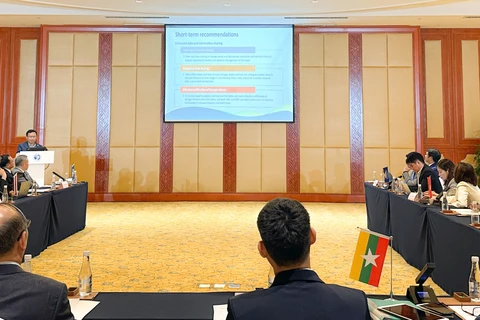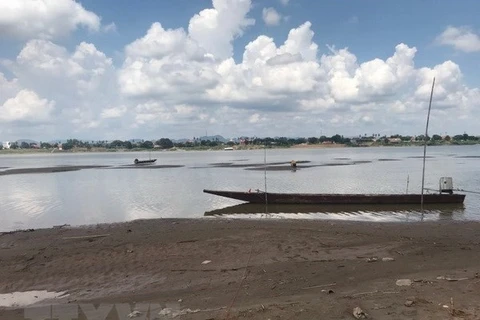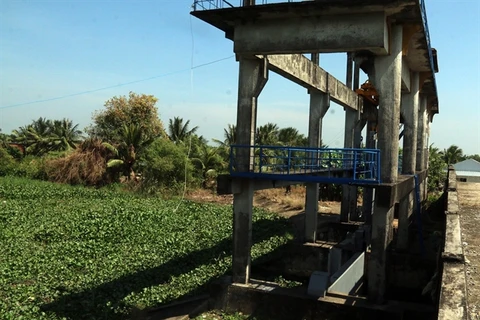Vientiane (VNA) – The 13th Mekong River Commission (MRC) Regional Stakeholder Forum (RSF), a platform for relevant parties to get updated on hydropower and other developments along the Mekong River — Southeast Asia’s largest river, was held in the Lao city of Luang Prabang on October 5.
The event brought together representatives from MRC member countries, namely Vietnam, Laos, Cambodia and Thailand, agencies operating in energy, environment, fishery and irrigation, among others, and the MRC’s dialogue partners – China and Myanmar, as well as the private sector and development partners of the MRC.
The Vietnamese delegation was led by Truong Hong Tien, Permanent Deputy Chief of Office of the Vietnam National Mekong River Committee.
The participants looked into a draft document on the situation of the Mekong River Basin, the main findings of which show that climate change has impacted the flow of the Mekong River, the average temperature on the entire basin has risen 1.4 degrees C over the past 50 yeears and the numbers of days with big and medium rains have decreased in countries in the region.
The event brought together representatives from MRC member countries, namely Vietnam, Laos, Cambodia and Thailand, agencies operating in energy, environment, fishery and irrigation, among others, and the MRC’s dialogue partners – China and Myanmar, as well as the private sector and development partners of the MRC.
The Vietnamese delegation was led by Truong Hong Tien, Permanent Deputy Chief of Office of the Vietnam National Mekong River Committee.
The participants looked into a draft document on the situation of the Mekong River Basin, the main findings of which show that climate change has impacted the flow of the Mekong River, the average temperature on the entire basin has risen 1.4 degrees C over the past 50 yeears and the numbers of days with big and medium rains have decreased in countries in the region.
According to the MRC’s 2023 report, the flow of the river has changed significantly, higher than the average during the dry season and lower than the average level during the rainy season.
The lower flow in the rainy season has reduced the reversal flows in the Tonle Sap Lake, leading to the increasing area of saltwater intrusion in the Cuu Long (Mekong Delta) region. Besides, sediment loads at MRC’s monitoring stations have decreased remarkably, resulting in riverbank instability and coastal erosion.
Experts said apart from changed flows, the quality and volume of Mekong River downstream flows have also dropped, affecting agricultural production and aquaculture, especially in Vietnam’s Mekong Delta region.
Nguyen Nhan Quang, former deputy secretary general of the Vietnam National Mekong River Committee, stressed that the Mekong Delta faces more severe erosions due to water quality degradation. In addition, fishing catches in the Khone Waterfall (at the border between Laos and Cambodia) and the Mekong Delta have reduced remarkably.
Anoulak Kittikhoun, CEO of the MRC Secretariat, pointed to challenges to lower Mekong countries, including impacts from rapid development and climate change, saying the MRC always encourages joint projects to handle the problems./.
The lower flow in the rainy season has reduced the reversal flows in the Tonle Sap Lake, leading to the increasing area of saltwater intrusion in the Cuu Long (Mekong Delta) region. Besides, sediment loads at MRC’s monitoring stations have decreased remarkably, resulting in riverbank instability and coastal erosion.
Experts said apart from changed flows, the quality and volume of Mekong River downstream flows have also dropped, affecting agricultural production and aquaculture, especially in Vietnam’s Mekong Delta region.
Nguyen Nhan Quang, former deputy secretary general of the Vietnam National Mekong River Committee, stressed that the Mekong Delta faces more severe erosions due to water quality degradation. In addition, fishing catches in the Khone Waterfall (at the border between Laos and Cambodia) and the Mekong Delta have reduced remarkably.
Anoulak Kittikhoun, CEO of the MRC Secretariat, pointed to challenges to lower Mekong countries, including impacts from rapid development and climate change, saying the MRC always encourages joint projects to handle the problems./.
VNA























